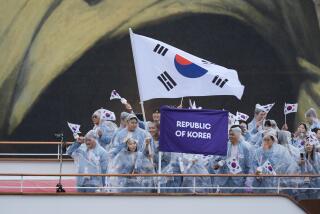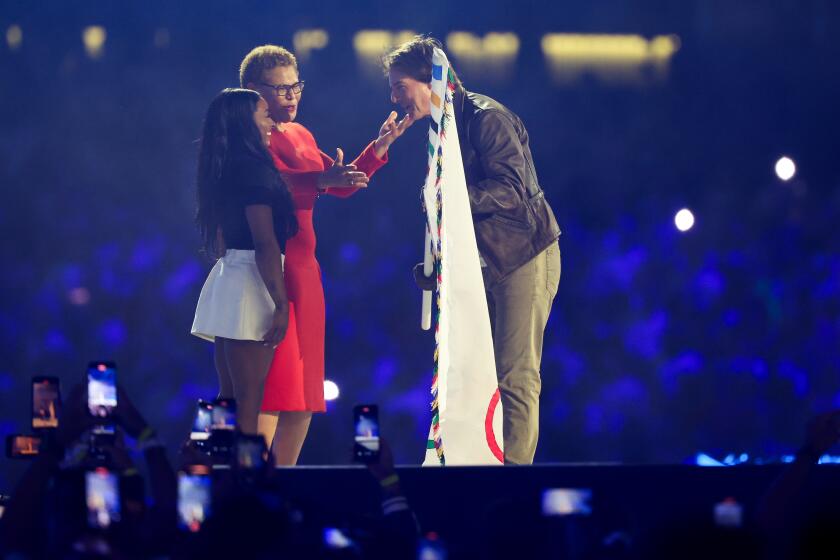Asian Games Report / Randy Harvey : Koreans Still Short of Summer Games Accord
SEOUL, South Korea — With the 1988 Summer Olympics scheduled to be held in South Korea, North Korea has been trying to show that it also stands tall in the world.
Perhaps as a part of this effort, the North Korean government has passed a law barring any adult male shorter than 5 feet 8 1/2 inches from living in the capital city, Pyongyang.
Finally, someone has taken Randy Newman seriously. The singer-songwriter had a hit in which he sang “Short people got no reason to live.” In Pyongyang, life imitates art.
The short-sighted legislation is only one example, but South Koreans say it is indicative of the North Koreans’ bizarre approach to life. Even though they share a heritage, a language and a peninsula, Koreans, North and South, are finding that they have increasingly less in common.
For that reason, negotiations between South Korea and North Korea, on those rare occasions when they occur, can go on for as long as “M*A*S*H” reruns.
But in the ongoing saga of whether the 1988 Summer Games will be held on both sides of the DMZ, as has been demanded by North Korea, Juan Antonio Samaranch, president of the International Olympic Committee, has established a deadline of Sept. 17, 1987, one year before the opening ceremony in Seoul.
South Korean officials say publicly that an accommodation can be reached. Privately, they recall other times when they have been optimistic during negotiations, only to be disappointed by the North Koreans’ ultimate intransigence.
There is no question, however, that progress has been made since last October during three meetings mediated by Samaranch.
When discussions began, the North Koreans insisted on being co-hosts. They later softened their position, demanding 10 events. South Korea offered two preliminaries.
After the latest round of talks in June, Samaranch announced that both sides had accepted a proposal that would put the preliminaries and finals of archery and table tennis and a preliminary round of soccer in North Korea. He also said that a bicycle race would begin in North Korea and end in Seoul.
North Korea’s acceptance, however, was conditional. Samaranch would not reveal the conditions, but they are believed to concern television revenues, the official title of the games and responsibility for the opening and closing ceremonies.
More importantly, in announcing on the eve of the Asian Games here two weeks ago that a fourth meeting would be scheduled for this fall, Samaranch also indicated that the North Koreans are concerned about an IOC requirement that they open their doors to all officials, athletes, journalists and spectators during the Games.
After operating one of the world’s tightest borders for the last 25 years, the North Koreans probably are not eager to have 200,000 tourists driving into Pyongyang in their rented Hyundais, looking for the nearest McDonald’s and asking questions about why they haven’t seen any short people.
“That is the big question,” said Lee Ha Woo, general secretary of the Seoul Olympic Organizing Committee when asked whether he thought the North Koreans would agree to open their border. “If they accept foreigners into their country, it’s going to be a major departure from their policies.”
For South Koreans, it is important for two reasons that they reach an agreement with North Korea.
In their quest for eventual reunification with the North, South Koreans are encouraged by any thaw in relations.
“For the short term, I sincerely believe North Korea’s participation in the Olympics would lift tension on the peninsula,” Lee said.
South Korean officials also believe that North Korea’s acceptance of an Olympic invitation would assure that there is no Eastern Bloc boycott.
But even without North Korea, South Korean officials are confident that most other Communist countries, including the Soviet Union and East Germany, will participate.
North Korea’s boycott of the Asian Games was joined by five other countries, Mongolia, Afghanistan, Vietnam, South Yemen and Laos. But North Korea was embarrassed when China, one of its closest allies, sent the third-largest delegation to Seoul.
Although the Chinese are noncommittal about the 1988 Summer Olympics, their presence here is believed to indicate their leanings.
Likewise, the Soviets haven’t committed. But a Soviet Olympic Committee official who was here last week said he was impressed by Seoul’s preparations for the Games and noted that the Soviet soccer team is practicing for the Olympic elimination tournament, which will begin in October.
South Korean officials say they believe the Chinese and Soviets are withholding commitments to give North Korea more leverage but will attend the Olympics regardless of the outcome of negotiations.
Choy Man Lip, secretary general of the Korean Olympic Committee, said he has received assurances from East Germany, Czechoslovakia, Hungary, Romania and Yugoslavia that they will attend.
As for pronouncements by Cuba and Nicaragua that they will stand by the North Koreans, Choy called them “lip service.”
“My feeling is that the countries that boycotted in 1984 won’t boycott again,” said Choy, a UCLA graduate. “They won’t come because the Games are here but because they don’t want to prevent an entire generation of athletes from competing in the Olympics. That could be devastating to the future of their athletic programs.”
Choy also said he is optimistic that the North Koreans will participate.
“We have to find some way for them to save face, but I think there will be a breakthrough in the next meeting,” he said. “We’re not in a hurry. We have until next September. They can get here in an hour and a half. Our door is always open.”
South Korea’s door was open five months before the 1984 Summer Games, when the North Koreans suggested combining teams, even though no one expected it to be easy to arrange. Negotiations ended when North Korea joined the Soviet boycott.
“To form a joint team between South and North Korea is not different from making a single team between the U.S.A. and Cuba,” said South Korea’s sports minister, Lee Sei Kee.
For example, after a North Korean army lieutenant won a gold medal in shooting during the 1972 Munich Olympics, he said he aimed as if he were “aiming at the heart of the enemy.”
With teammates like that, who needs enemies?
More to Read
Go beyond the scoreboard
Get the latest on L.A.'s teams in the daily Sports Report newsletter.
You may occasionally receive promotional content from the Los Angeles Times.








